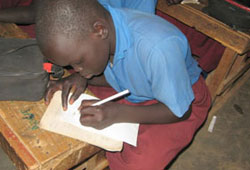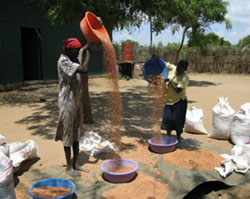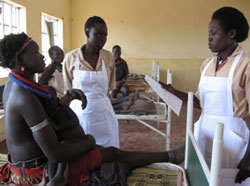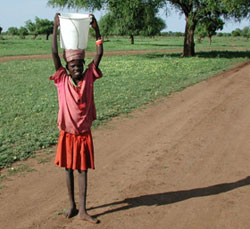September 24, 2018
Mercy Day

The Institute of the Sisters of Mercy of the Americas is comprised of six Communities who serve in North, South and Central America, the Caribbean, Guam and the Philippines. There are approximately 4,000 vowed members of the Institute; 3,000 associates; and 8 Companions of Mercy (a new lay movement whose members make a private vow of service).
Sisters and associates who form the Caribbean, Central America, and South America (CCASA) Community have been carrying out the mission of Mercy in the following eight countries: Argentina, Belize, Chile, Guatemala, Guyana, Honduras, Panama, and Peru. Sisters and associates who minister in Jamaica, Guam, and the Philippines are part of Communities whose central offices are in the United States. Additional countries where a member of the Institute of the Americas lives and ministers are: Bahamas, Bolivia, Federated States of Micronesia (island of Chuuk), Ireland, Italy, Mexico, Puerto Rico, South Africa, Sudan, and Uganda.
The Institute of the Sisters of Mercy of the Americas are guided by their direction statement:
Animated by the Gospel and Catherine McAuley's passion for the poor, we, the Sisters of Mercy of the Americas, are impelled to commit our lives and resources to act in solidarity with:
 the economically poor of the world, especially women and children;
the economically poor of the world, especially women and children;This commitment will impel us to:
 develop and act from a multicultural and international perspective;
develop and act from a multicultural and international perspective;An example of Sisters of Mercy of the Americas living this commitment is seen in the ministry of Mercy Beyond Borders.
 Sr. Marilyn Lacey is Director of MERCY BEYOND BORDERS (MBB), an organisation founded in 2008 by three colleagues, a Sister of Mercy, a university professor, and a medical doctor who are all determined to improve the lives of displaced women and children living in extreme poverty. MERCY BEYOND BORDERS is targeting Southern Sudan, which has one-quarter of the world's displaced peoples. MERCY BEYOND BORDERS believes that extreme poverty can be alleviated through external intervention. Extreme poverty is poverty that kills for lack of adequate nutrition, shelter, clean water and medicines. Its epicenter is sub-Saharan Africa, where nearly half the population struggles to survive on less than $1/day. Among all who suffer from extreme poverty, the most vulnerable are women & children displaced by war.
Sr. Marilyn Lacey is Director of MERCY BEYOND BORDERS (MBB), an organisation founded in 2008 by three colleagues, a Sister of Mercy, a university professor, and a medical doctor who are all determined to improve the lives of displaced women and children living in extreme poverty. MERCY BEYOND BORDERS is targeting Southern Sudan, which has one-quarter of the world's displaced peoples. MERCY BEYOND BORDERS believes that extreme poverty can be alleviated through external intervention. Extreme poverty is poverty that kills for lack of adequate nutrition, shelter, clean water and medicines. Its epicenter is sub-Saharan Africa, where nearly half the population struggles to survive on less than $1/day. Among all who suffer from extreme poverty, the most vulnerable are women & children displaced by war.
 MBB use three methods to alleviate extreme poverty: educating women and girls, funding small entrepreneurial projects designed & implemented by the displaced women themselves, and promoting maternal/child health. Education of girls in Sudan is considered to be revolutionary as girls seldom are prioritised for education. MBB intends to become the premier provider of academic scholarships in all of Sudan, both for primary school students needing sponsorship in order to continue on to high school, and for high school grads desirous of enrolling in higher education to become teachers or nurses.
MBB use three methods to alleviate extreme poverty: educating women and girls, funding small entrepreneurial projects designed & implemented by the displaced women themselves, and promoting maternal/child health. Education of girls in Sudan is considered to be revolutionary as girls seldom are prioritised for education. MBB intends to become the premier provider of academic scholarships in all of Sudan, both for primary school students needing sponsorship in order to continue on to high school, and for high school grads desirous of enrolling in higher education to become teachers or nurses.
 MBB is working with Teody Achilo, one of the founders of the Sudanese Women's Voice for Peace, to fund self-help projects designed by refugee women returning to their home villages after 10 or even 20 years in refugee camps. Many have expressed strong interest in starting small businesses. MBB stands with them to provide seed capital and basic business training.
MBB is working with Teody Achilo, one of the founders of the Sudanese Women's Voice for Peace, to fund self-help projects designed by refugee women returning to their home villages after 10 or even 20 years in refugee camps. Many have expressed strong interest in starting small businesses. MBB stands with them to provide seed capital and basic business training.
Experts have likened Sudan’s dismal healthcare to “a perfect storm” of tropical diseases, lack of infrastructure, and a near total absence of trained professionals—a situation made all the worse by decades of war. Problems that have been eradicated in most of the rest of the world, like guinea worm and polio and Hansen’s disease (leprosy) are still rampant in Sudan. MBB is engaged in small-scale efforts to assist women and children’s healthcare.